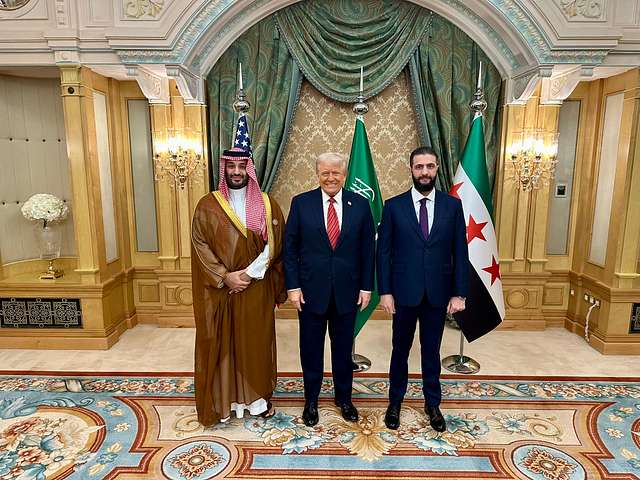Ann Arbor (Informed Comment) – Syria’s parliamentary elections on October 5 raised alarm flags for me on several grounds.
First, they were not conducted on the basis of a direct vote. Sixty “constituencies” were established to elect 121 members of the People’s Assembly of Syria (only 119 were actually elected). Another 70 members will be appointed by the self-appointed president of the country, Ahmad al-Sharaa (nom de guerre Abu Muhammad al-Julani), a former leader of al-Qaeda in Syria who came to power when guerrillas swept into Damascus last fall.
The “constituencies” are sort of like the American electoral college, except that they were selected by committees of the ruling rebels. So the hard line fundamentalists who took over Syria got to appoint a small electorate, marginalizing most Syrians. And the leader of the fundamentalists will appoint the other third of the members of parliament.
To be fair, the government at least said it wanted the members of parliament to be academics and technocrats.
The second problem was that constituencies were not established in Raqqah, al-Hasakah or Suwayda, the two Kurdish-dominated provinces and the southern Druze-dominated province.

Juan Cole
P. O. Box 4218,
Ann Arbor, MI 48104-2548
USA
(Remember, make the checks out to “Juan Cole” or they can’t be cashed)
A third problem is that the constituencies from Alawi Shiite areas such as Latakia only elected two Alawis to parliament. They are likely 14% of the country, and so should have had 16 or 17 members in the elected part of parliament. They should have another 10 among the appointed seats, for a total of 26 or 27. So far, they have two.
About 12 Kurds should be sitting in parliament. and another 7 should be appointed. So far, as I understand it, there are only 10 members of parliament from the minorities, 8 if we don’t count the Alawis. It is rumored (the exact outcome is hard to nail down) that these 8 include three or four Kurds from Afrin Province. If al-Hasakah and Raqqah are ever able to vote, they will return at least some Kurds, but likely not in numbers proportionate with the Kurds’ 10% of the Syrian population. All this stings because in the mid-1960s the then Arab nationalist government stripped the people of al-Hasakah of Syrian citizenship. Arab nationalists and fundamentalists have a long history of disenfranchising the non-Arab Kurds, who in Syria tend to be secular-minded socialists or Sufis and so are disliked by the fundamentalist Arabs.
There should be three or four Druze (an esoteric offshoot of Ismaili Shiism) among the elected MPs.
Although over 200 women were nominated in the constituencies, only six were elected. I had thought that there was a mandate that 20% of MPs be women. If so, President al-Sharaa would have to appoint 36, over half of his 70. What we have seen in Pakistan and Iraq, however, is that women appointed or elected to parliament tend to vote their party, including fundamentalist parties, rather than necessarily to take up the cause of women or to vote like feminists.
The new Syrian parliament is a parliament of Sunni Arab men, and given the process that elected them, likely they are religiously conservative Sunni Arab men, ruling a country that probably thirty percent minorities and another thirty percent secular-minded urban people.
Gee, it looks a little like the US Congress in the US today.
Never miss an issue of Informed Comment: Click here to subscribe to our email newsletter! Social media will pretend let you subscribe but then use algorithms to suppress the postings and show you their ads instead. And please, if you see an essay you like, paste it into an email and share with friends.
So here is what is alarming. This Syrian parliament is a mirror image of the Iraqi constituent assembly / parliament that was elected in late January 2005 under the Bush administration. The Iraqi parliament with 275 seats only had about 17 Sunni Arabs in it because the Sunni Arabs boycotted the elections, which were held under a proportional system. I figure Sunni Arabs in Iraq at something like 22% of the population, so they were a minority. But they had been in power for centuries and were a functional majority.

File photo. President of the United States Donald Trump with Saudi Crown Prince Mohammed Bin Salman and President of Syria Ahmed al-Sharaa during Donald Trump’s state visit to Saudi Arabia. US State Department. Public Domain. Via Picryl.
The Kurds, Alawites, Druze, Shiites and Christians who have such low levels of representation in the Syrian parliament probably come to 34% or so of the Syrian population. So the disenfranchised minorities in Syria are if anything a larger proportion of the population than in Iraq.
In Iraq in 2005, the lack of representation for Sunni Arabs in the constitution-writing constituent assembly that doubled as a parliament led to a Sunni Arab rejection of the new constitution in a referendum of October 2005. By February of 2006 a civil war had broken out that left 34,000 dead in 2006 alone and continued well into 2007. The civil war broke out despite the military occupation of the country by 140,000 US troops.
Syria doesn’t have a functioning army. Its new leaders are trying to cobble a diverse set of guerrilla groups into one, but it will be hard work and may not succeed. If large scale sectarian violence breaks out, who will resolve it?


 © 2026 All Rights Reserved
© 2026 All Rights Reserved